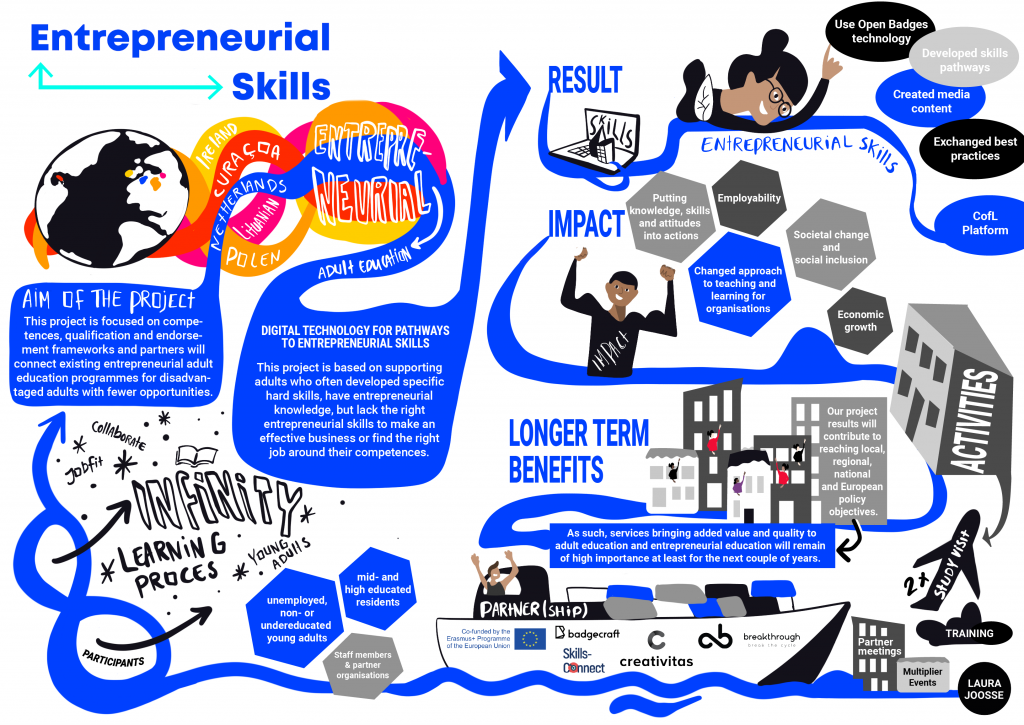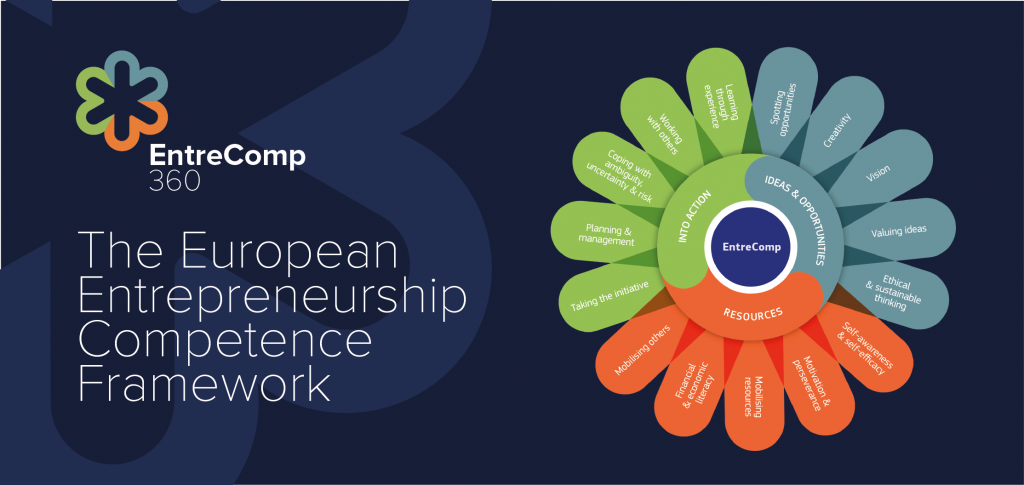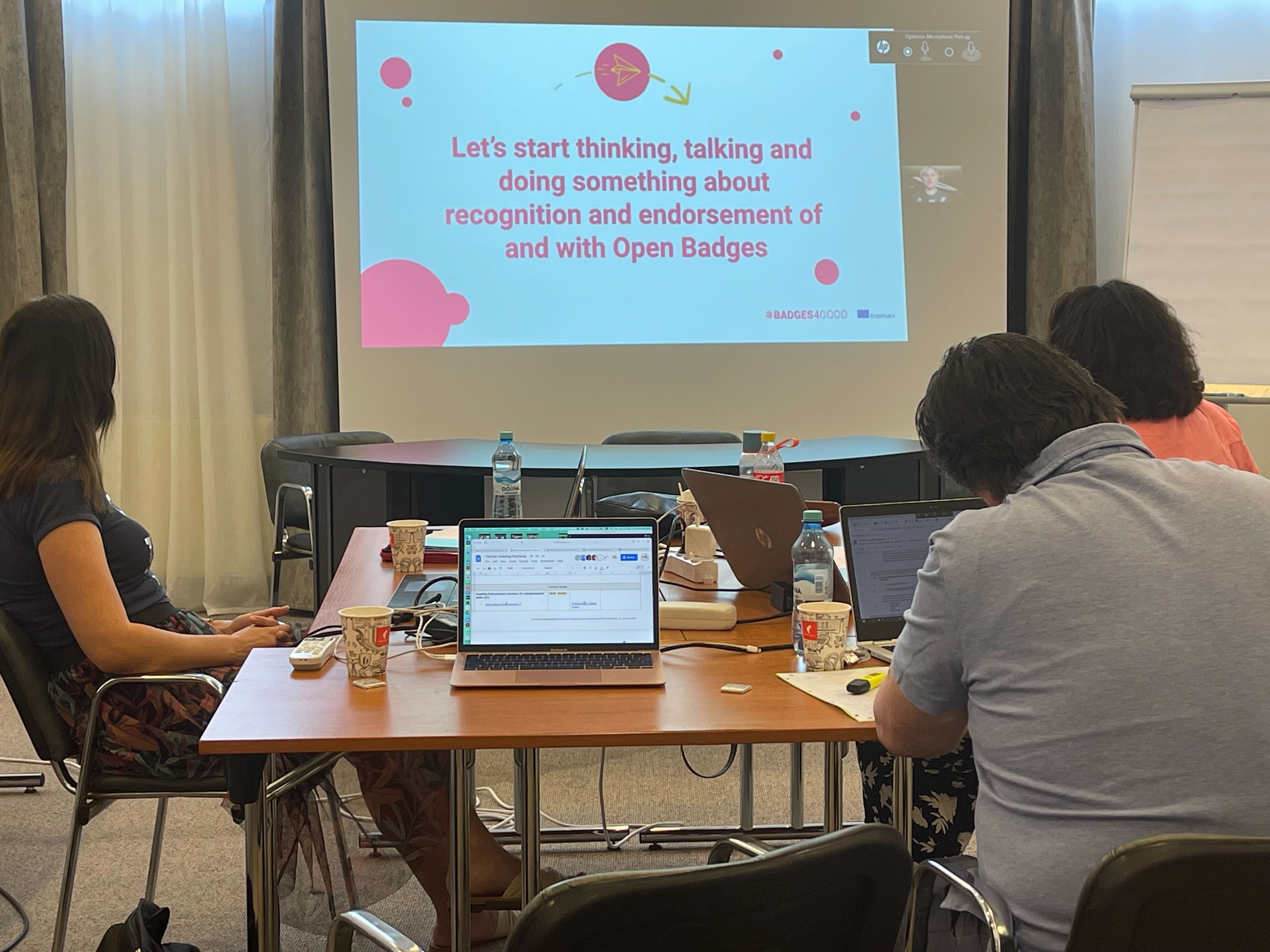BlogArticlesStudy visit in Romania: connecting diverse experiences in entrepreneurial skills development
Awero team
Study visit in Romania: connecting diverse experiences in entrepreneurial skills development
2 Jan, 20:29
The development of the entrepreneurial capacity of European citizens and organisations is one of the key policy objectives for the EU and the Member States. The European Commission identifies entrepreneurship as one of the 8 key competences for lifelong learning necessary for personal fulfillment, a healthy and sustainable lifestyle, employability, active citizenship and social inclusion.

A study visit took place from 20–24th June 2022 in Romania, during the projec “Digital technology for pathways to entrepreneurial skills”. The project is based on competencies, qualification and endorsement frameworks, and partners spent more than a year already connecting existing entrepreneurial adult education programmes for disadvantaged adults with fewer opportunities. Project partners are using entrepreneurial frameworks to recognise, endorse, and acknowledge prior learning, on the job learning and learning in the educational programmes.
The project coordinator, Sandra Zoomers, from Netherlands based organisation Breakthrough, explains what are the entrepreneurial competences.
We follow the EntreComp competence framework. They have 3 areas: Ideas and opportunities, Resources and Into Action. In the project we are creating learning playlists that cover all 3 areas of the framework.

Study visit in Romania
Covid-19 pandemic had a strong impact on the timeline of the project, but eventually partner organisations met for a study visit in Drobeta Turnu Severin, Romania, hosted by local partner Youthopolis. Local project coordinator Adina Stoleriu arranged a variety of visits to local organisations and institutions caring for the theme of this project. Among them– local municipality, a social enterprise– vegan restaurant, and the Economical High School in Drobeta Turnu Severin.
At national level, Romania is more and more into exploring and cultivating the aptitudes and passions of people. Hence the entrepreneurial programs financed by national and european grants that support starting a business for different categories: students, people from rural areas, people who returned from abroad etc. These programs are visible in our town as well, the places we visited act as springs of good practices and inspiration for each potential entrepreneur, – says Adina.

Participant of the study visit, Sandra, got plenty of inspiring ideas for her daily work.
The Entrepreneurial skills project is letting me deepen my understanding of how to recognise prior learning better and connect them with the different entrepreneurial skills that people already have worked on and show in different settings. The study visit, while visiting the mayor and municipality, the city’s entrepreneurial support, a startup and young people who built up their mock (fake) company impressed me a lot. Small cities can create a big impact for their citizens when policies are right.
One of the most unique aspects in the consortium– is having a local partner from Curacao Island of Learning. In this way partners had a chance to exchange various local experiences. The local project coordinator from Curacao Eunice Eisden reflected her experience in Romania and compared how entrepreneurial competence development is implemented in Europe and in the Caribbean island.
There are similarities, like the way Severin offers entrepreneurial learning opportunities. In Curacao a vocational school also offers the opportunity to not only set up mock companies, but encourage learners who want to, to set up their real companies.
Another important aspect of the project is to ensure the accessible entrepreneurial skills development and recognition for disadvantaged adults with fewer opportunities. Project partner from the Netherlands, organisation Skills Connect, Mark Vlak explained that those skills can be developed only if the content is tested and proven to be useful and effective like in former programmes.
What is more, help and support of an experienced expert from the target group is always needed. If you ensure that – there will be more willingness to learn, it will build a more sustainable circle of trust, – says Mark.
Using technology for learning and recognition
An integral part of the project is using digital technologies – Open badges and Cities of learning platform by creating meaningful learning pathways for young adults. During the study visit partners learned more about the value of recognition with Open badges and the impact of technology on learning. Recognition of competences is crucial in one’s learning journey – it’s not only how you learnt it, but also what you learnt and who endorses your learning achievements.
Angelique Schoone from Marlijn Akademie, the Netherlands, stresses on the importance of recognising the competences acquired.
We work with our students in practice. We speak with them about what they have to learn which is described on their qualification dossier. After they finish their task, they write a Starr. This is a method where we can see if they understand their competences and what is written in the working process.
During this project partners will develop endorsement schemes and implement it technically on the Cities of Learning platform.

“Cities of Learning platform can support adult learners in making their prior learning visible. Most adults have entrepreneurial skills prior to starting their educational paths”, – says Nerijus Kriauciunas, the CEO of Badgecraft, the IT developing partner in this project. He also claims that another example is how Open Badges technology can show a learner’s progress and skills portfolio acquired during adult education programmes.
The impact of the study visit
The study visit was, without a doubt, an inspiration to all participants and built capacities of the participating organisations. Angelique, one of the participants reflected:
“That was a very interesting study visit where I learned a lot how Cities of Learning work. I’m looking in my mind what it could mean for my job and clients from the 3Antonius organisation.”
One young participant Devyn, from Dutch Cities of Learning, was impressed about the organisational side of the Cities of Learning network:
I have a deep, deep respect for every hosting partner, and connecting partner. Besides that, we shared some really good practices and methods on entrepreneurial skills. For me it’s also good to practice with the platform itself, to get a deeper understanding about the what’s and why’s.
Eunice from Curacao shared:
The study visit was a great experience. It became very clear that exchanging ideas and strategies on how to recognize and validate prior learning is a powerful way for inclusion. Nice to see that there are similarities in the way Romania implements Entrepreneurial learning in their curricula. Being part of this study visit create also made me further understand how to use the playlist and badges in different ways to connect with learners.
Check out the photo gallery of the visit and follow the updates of this project on Cities of Learning social media channels!
The project “Digital technology for pathways to entrepreneurial skills” is funded by the EU programme Erasmus+

Podelite :
Badgecraft drži i razvija ovu platformu sa vodećim obrazovnim organizacijama. Program Evropske unije Erasmus+ odobrio je sufinansiranje za izradu prve verzije ove platforme. Kontaktirajte support@badgecraft.eu.
Platforma
Promenite na drugi jezik:
